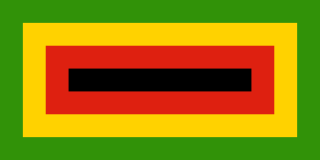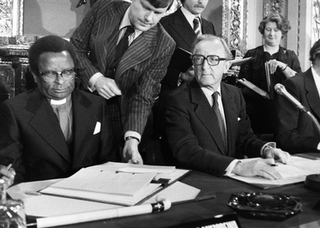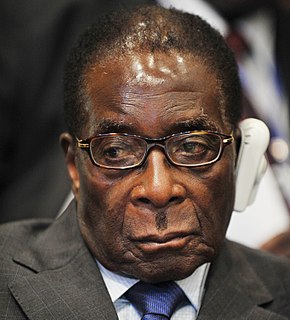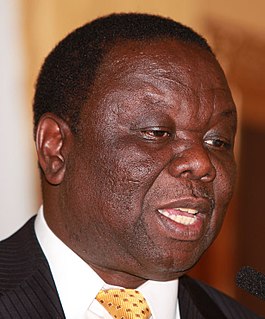This article needs additional citations for verification .(April 2007) (Learn how and when to remove this template message) |
Coordinates: 17°53′18.8″S30°59′31.4″E / 17.888556°S 30.992056°E

A geographic coordinate system is a coordinate system that enables every location on Earth to be specified by a set of numbers, letters or symbols. The coordinates are often chosen such that one of the numbers represents a vertical position and two or three of the numbers represent a horizontal position; alternatively, a geographic position may be expressed in a combined three-dimensional Cartesian vector. A common choice of coordinates is latitude, longitude and elevation. To specify a location on a plane requires a map projection.
The Zimbabwe grounds are an area within Highfield Suburb on the south of Zimbabwe's Capital, Harare. It is surrounded by Old Highfield section on the greater part and share borders with Takashinga cricket ground (home ground of Andy Flower and Tatenda Taibu), Zimbabwe Hall, Highfield Library, a Nursery School, Anglican Church and Chipembere Primary School annexe. The grounds are within a stone's throw of Gwanzura football stadium.

Highfield is the second oldest high-density suburb or township in Harare, Zimbabwe built to house Rhodesians of African origin, the first being Mbare. Highfield was founded on what used to be Highfields Farm. It is of historical, cultural and political significance to Zimbabwe and is known as Fiyo in local slang. It is one of the birthplaces of the Zimbabwe African National Union and is home to several prominent people in the country.

Andrew Flower OBE is a South African born former Zimbabwean cricketer who captained the Zimbabwe national cricket team. He was Zimbabwe's wicket-keeper for more than 10 years and statistically by far the finest batsman the country has fielded.
Tatenda Taibu is a Zimbabwean cricketer who captained the Zimbabwe national cricket team. He is a wicket-keeper-batsman. On 6 May 2004, he became the youngest Test captain in history, when he captained his team against Sri Lanka.
These grounds normally stage the Makomva League social soccer games on Saturdays, Sundays and Public holidays. The tennis and basketball are open to the public and admission is free for every event.
The Zimbabwe Grounds are famous for having hosted Robert Mugabe's ZANU party's "Star Rally" in 1980. It is at this meeting that he made his famous prediction for a landslide victory at the impending Commonwealth-supervised elections, the first in which ZANU would be participating. As Mugabe had predicted, ZANU won; he has been at the helm of the Zimbabwean government ever since. [1]

Robert Gabriel Mugabe is a Zimbabwean revolutionary and politician who served as Prime Minister of Zimbabwe from 1980 to 1987 and then as President from 1987 to 2017. He chaired the Zimbabwe African National Union (ZANU) group from 1975 to 1980 and led its successor political party, the ZANU – Patriotic Front (ZANU–PF), from 1980 to 2017. Ideologically an African nationalist, during the 1970s and 1980s he identified as a Marxist–Leninist, although after the 1990s self-identified only as a socialist. His policies have been described as Mugabeism.
The Zimbabwe Grounds were the scene of widespread chaos and violence on March 11, 2007. This occurred after opposition members, church members, national constitutional members, and the general public gathered for a 'prayer meeting, to protest against the death of democracy and general hardships in Zimbabwe' The government of Zimbabwe of Robert Mugabe viewed this gathering as a severe case of civil disobedience. It perceived this gathering as pilot for a 'revolution'. The government responded with a heavy hand in their efforts to disperse the gatherers. This clashes resulted in the fatal shooting of Gift Tandare an MDC activist as police resorted to using live ammunition against the masses.
Gift Tandare was a member of the Zimbabwe political party Movement for Democratic Change. He was shot dead by police at a prayer meeting. The government of Zimbabwe denied the family permission to bury him at Granville cemetery in Harare, fearing reprisals from mourners. He was buried at his rural home.
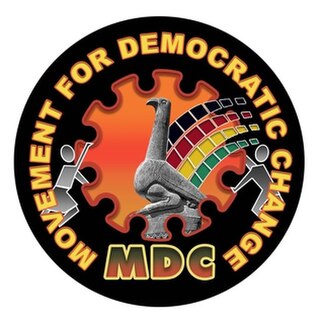
The Movement for Democratic Change – Tsvangirai (MDC–T) is a center-left political party and currently the main opposition party in the House of Assembly of Zimbabwe ahead of the 2018 elections. After the split of the original Movement for Democratic Change in 2005, the MDC–T remains the major opposition faction. The smaller faction is the Movement for Democratic Change – Ncube, or MDC–N, led by Welshman Ncube.

Ammunition is the material fired, scattered, dropped or detonated from any weapon. Ammunition is both expendable weapons and the component parts of other weapons that create the effect on a target. Nearly all mechanical weapons require some form of ammunition to operate.

